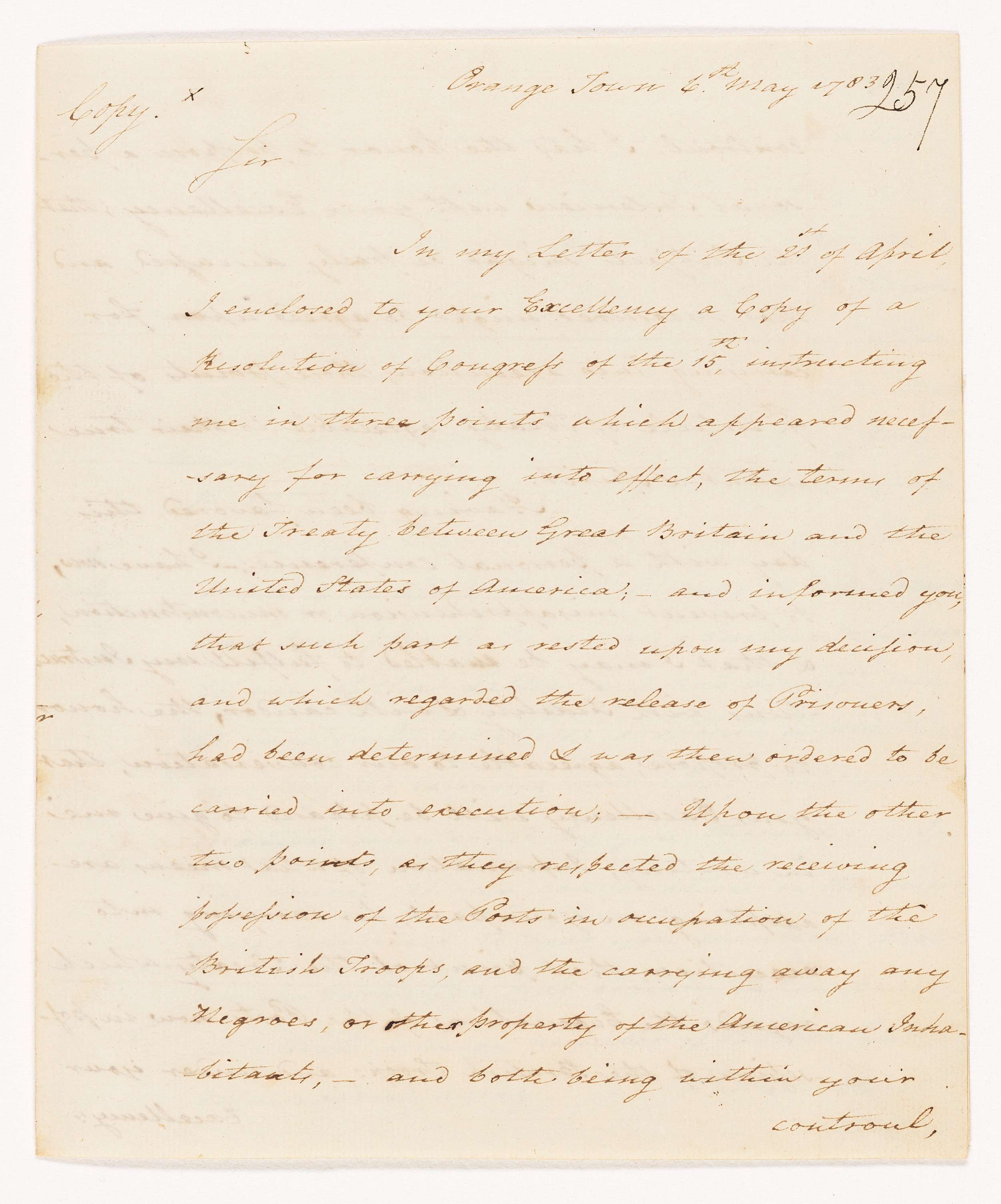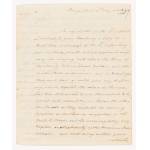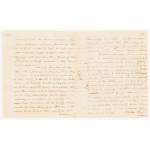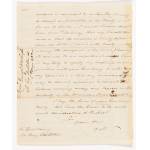Letter from George Washington to Guy Carleton
5/6/1783
Add to Favorites:
Add all page(s) of this document to activity:

Add only page 1 to activity:
Add only page 2 to activity:
Add only page 3 to activity:
George Washington sent this letter to Sir Guy Carleton, commander of British forces during the Revolutionary War, after meeting with him in person to discuss the British evacuation from New York at the end of war. It illustrates a disagreement between General Washington and Sir Carleton.
The Preliminary Articles of Peace signed in Paris on November 30, 1782, stipulated that the United Kingdom return all property that was seized during the War, including slaves. Sir Carleton, however, intended to keep the promise of freedom that was made to African Americans who joined and fought for the British. Washington demanded the return of escaped slaves, but Carleton countered that, under the King’s orders, slaves reaching British lines were to be freed.
Washington wrote:
The "Book of Negroes, or "Inspection Roll of Negroes" as the American version is called, listed those who were evacuated – to tally the loss of "property" for which the British government might compensate the United States at a later date. (No record of that payment has been found.) In 1792, over 1,000 of the new African Canadians continued on and settled back on the continent of Africa, establishing the city of Freetown, Sierra Leone.
The Preliminary Articles of Peace signed in Paris on November 30, 1782, stipulated that the United Kingdom return all property that was seized during the War, including slaves. Sir Carleton, however, intended to keep the promise of freedom that was made to African Americans who joined and fought for the British. Washington demanded the return of escaped slaves, but Carleton countered that, under the King’s orders, slaves reaching British lines were to be freed.
Washington wrote:
The two leaders deferred the issue to future negotiations and ordered that the names be recorded of persons boarding British ships. Britain evacuated about 3,000 enslaved African Americans, indentured servants, and freedmen to the British colony of Nova Scotia in Canada along with British soldiers.I was surprised to hear you mention that an Embarkation had already taken place, in which a large Number of Negroes had been carryed away...my private opinion is, that the measure is totally different from the Letter & Spirit of the Treaty—But...I find it my duty to signify my Readiness, in Conjunction with your Excellency, to enter into any agreement, or take any measures which may be deemed expedient, to prevent the future carrying away of any Negroes or other Property of the American Inhabitants.
The "Book of Negroes, or "Inspection Roll of Negroes" as the American version is called, listed those who were evacuated – to tally the loss of "property" for which the British government might compensate the United States at a later date. (No record of that payment has been found.) In 1792, over 1,000 of the new African Canadians continued on and settled back on the continent of Africa, establishing the city of Freetown, Sierra Leone.
Transcript
Orange Town 6th May 1783Sir
In my Letter of the 21st of April I enclosed to your Excellency a Copy of a resolution of Congress of the 15th instructg me in three points which appear necessary for carrying into Effect the Terms of the provisional Treaty between Great Britain & the United States of America; and informed you, that such part as rested on my decision, and which regarded the Release of Prisoners, had been determined, & was then ordered to be carried into Execution. Upon the other two points, as they respected the receiving possession of the Posts in Occupation of the British Troops, and the carrying away of any Negroes or other property belonging to the American Inhabitants, they being both within your controul; I had the Honor to propose a personal Interview with your Excellency, that the Subjects might be freely discussed, and that measures might be agreed upon for carrying into Execution those two points of the 7th Article of the Treaty, according to their true Intent & Spirit.
Having this Day been favored with a personal conference, I have now, to prevent misapprehension or misconstruction, and that I may be enabled to fulfill my Instructions with fidelity & with candour, the Honor to propose, agreeable to our Conversation, that your Excellency will be pleased to give me in Writing, Information of what measures are adopting on your Post for carrying into execution that Part of the Treaty which regards the Evacuation of the Posts now in possession of the British Troops, & under your Command—and also, at what Time, it is probable those posts, or any of them may be relinquished & the fleets & Armies of his Britannic Majesty withdrawn.
Respecting the other point—in addition to what I mentioned in my Communication of the 21st ulto I took occasions in our Conversation to inform your Excellency, that in consequence of your Letter of the 14th of April, to R.R. Livingston Esqr. Congress had been pleased to make a further Preference to me of that Letter, & had directed me to take such measures as should be found necessary for carrying into Effect the several matters mentioned therein by you.
In the course of our Conference on this subject, I was surprised to hear you mention that an Embarkation had already taken place, in which a large Number of Negroes had been carryed away—Whether this conduit is consonant or not to, or how far it may be deemed an Infraction of the Treaty, is not for me to decide. I cannot however conceal from your Excellency, that my private opinion is, that the measure is totally different from the Letter & Spirit of the Treaty—But waving the Discussion of the point & leaving its decision to our respective Sovereigns, I find it my duty to signify my Readiness, in Conjunction with your Excellency, to enter into any agreement, or take any measures which may be deemed expedient, to prevent the future carrying away of any Negroes or other Property of the American Inhabitants.
I beg the favor of your Excellencys Reply—and have the Honor to be—With great Consideration & Respect Sir Your most Obedient Servant
Go: Washington
In my Letter of the 21st of April I enclosed to your Excellency a Copy of a resolution of Congress of the 15th instructg me in three points which appear necessary for carrying into Effect the Terms of the provisional Treaty between Great Britain & the United States of America; and informed you, that such part as rested on my decision, and which regarded the Release of Prisoners, had been determined, & was then ordered to be carried into Execution. Upon the other two points, as they respected the receiving possession of the Posts in Occupation of the British Troops, and the carrying away of any Negroes or other property belonging to the American Inhabitants, they being both within your controul; I had the Honor to propose a personal Interview with your Excellency, that the Subjects might be freely discussed, and that measures might be agreed upon for carrying into Execution those two points of the 7th Article of the Treaty, according to their true Intent & Spirit.
Having this Day been favored with a personal conference, I have now, to prevent misapprehension or misconstruction, and that I may be enabled to fulfill my Instructions with fidelity & with candour, the Honor to propose, agreeable to our Conversation, that your Excellency will be pleased to give me in Writing, Information of what measures are adopting on your Post for carrying into execution that Part of the Treaty which regards the Evacuation of the Posts now in possession of the British Troops, & under your Command—and also, at what Time, it is probable those posts, or any of them may be relinquished & the fleets & Armies of his Britannic Majesty withdrawn.
Respecting the other point—in addition to what I mentioned in my Communication of the 21st ulto I took occasions in our Conversation to inform your Excellency, that in consequence of your Letter of the 14th of April, to R.R. Livingston Esqr. Congress had been pleased to make a further Preference to me of that Letter, & had directed me to take such measures as should be found necessary for carrying into Effect the several matters mentioned therein by you.
In the course of our Conference on this subject, I was surprised to hear you mention that an Embarkation had already taken place, in which a large Number of Negroes had been carryed away—Whether this conduit is consonant or not to, or how far it may be deemed an Infraction of the Treaty, is not for me to decide. I cannot however conceal from your Excellency, that my private opinion is, that the measure is totally different from the Letter & Spirit of the Treaty—But waving the Discussion of the point & leaving its decision to our respective Sovereigns, I find it my duty to signify my Readiness, in Conjunction with your Excellency, to enter into any agreement, or take any measures which may be deemed expedient, to prevent the future carrying away of any Negroes or other Property of the American Inhabitants.
I beg the favor of your Excellencys Reply—and have the Honor to be—With great Consideration & Respect Sir Your most Obedient Servant
Go: Washington
This primary source comes from the Records of the Continental and Confederation Congresses and the Constitutional Convention.
Full Citation: Letter from George Washington to Guy Carleton; 5/6/1783; Miscellaneous Papers of the Continental Congress, 1774 - 1789; Records of the Continental and Confederation Congresses and the Constitutional Convention, Record Group 360; National Archives Building, Washington, DC. [Online Version, https://docsteach.org/documents/document/washington-carleton, April 23, 2024]Rights: Public Domain, Free of Known Copyright Restrictions. Learn more on our privacy and legal page.






